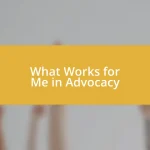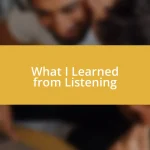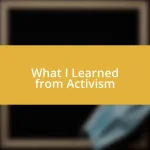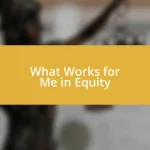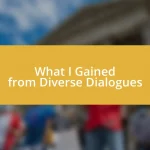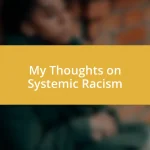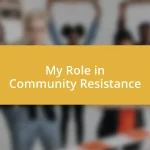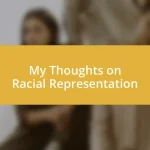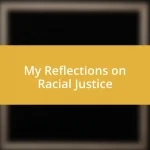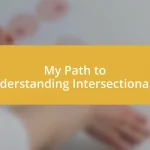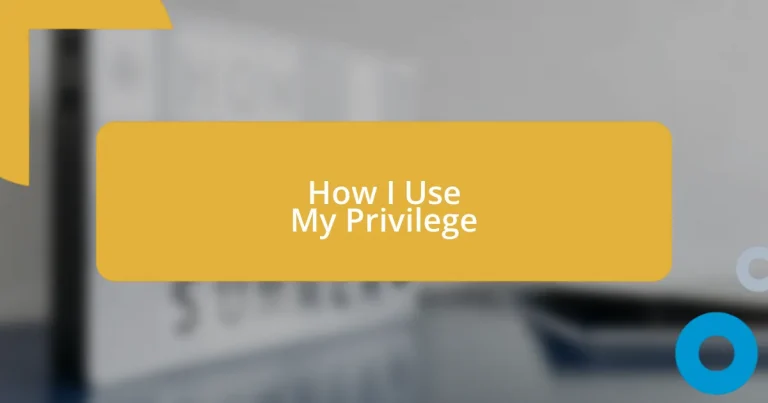Key takeaways:
- Recognizing privilege involves understanding how factors like socioeconomic status, race, and gender shape opportunities and barriers in society.
- Leveraging privilege can manifest through mentorship, advocacy, and creating inclusive networks that support marginalized communities.
- Engaging in meaningful conversations fosters empathy and awareness, promoting collective action and understanding among diverse groups.
- Continuous personal growth and education are crucial for effectively using privilege to uplift others and address systemic inequalities.
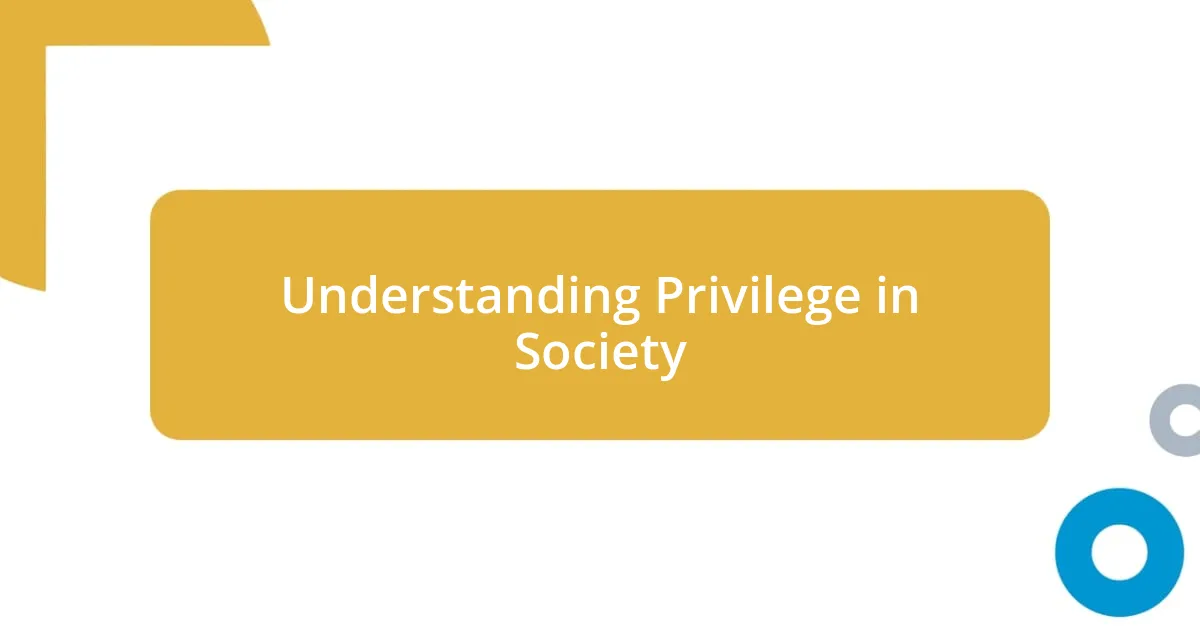
Understanding Privilege in Society
Privilege in society often manifests in various forms, such as race, gender, and socioeconomic status. I remember a time when I attended a networking event meant for young professionals. As I looked around, it struck me how the room was predominantly filled with people who shared similar backgrounds and experiences, which made me reflect on the networks I comfortably navigate due to my own privilege. Have you ever noticed how easy it is to find support in your community, while others might struggle?
I’ve realized that acknowledging my privilege isn’t about guilt; it’s about understanding the dynamics that shape interactions and opportunities. For instance, my access to quality education opened doors that many don’t even see. It makes me question: Why is it that some have to fight for the same opportunities that others receive by mere chance of birth?
When I think about privilege, I can’t help but connect it to the lived experiences of those around me. Listening to a friend share their struggle to climb the corporate ladder while facing bias revealed how systemic barriers can limit potential. That conversation made me wonder, how can I use my privilege to amplify the voices and experiences of others? It’s crucial that we all reflect on such questions to foster a more equitable society.
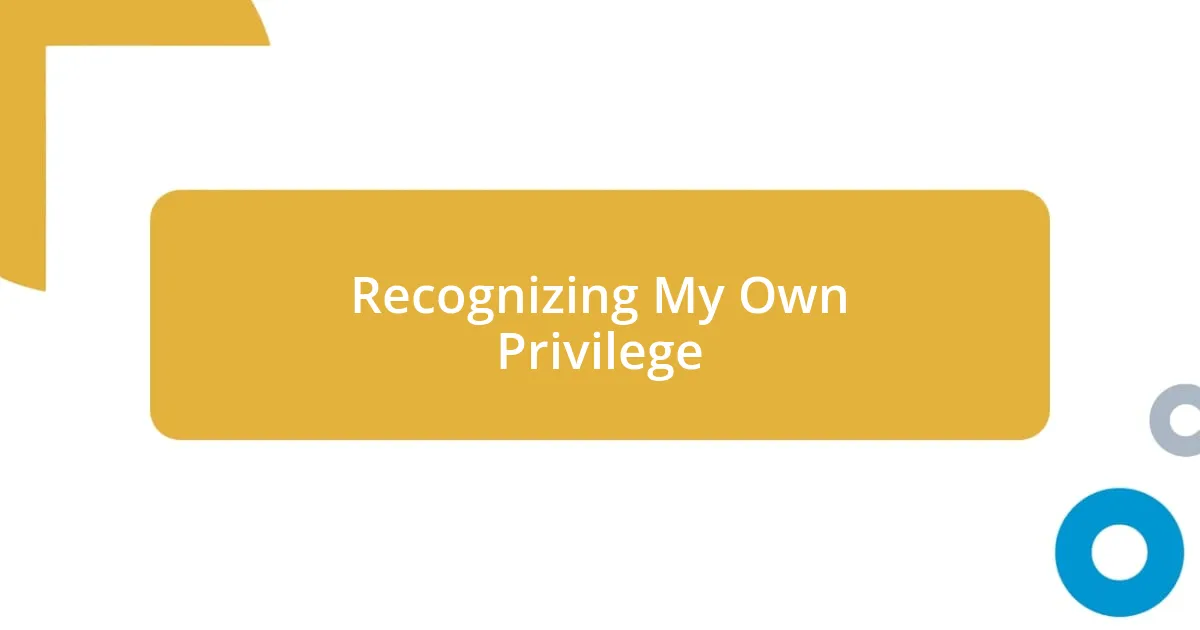
Recognizing My Own Privilege
Recognizing my own privilege has been an eye-opening journey. I’ll never forget a conversation with my friend from a different socio-economic background. She shared how she had to work multiple jobs while studying, while I had the luxury of focusing solely on my education without financial stress. It really hit me—this juxtaposition was a clear reminder of how privilege isn’t always visible but profoundly impacts our paths.
On another occasion, I found myself in a discussion about career promotions among colleagues. I noticed that many of us assumed we’d get opportunities due to our qualifications. However, my colleague, who faced discrimination because of her identity, pointed out that she had to work twice as hard to be recognized. This made me reflect deeply on the assumptions I had held. It became evident that privilege can create an invisible safety net, shielding some while leaving others vulnerable.
There’s no denying that recognizing privilege can be uncomfortable. However, I view it as a responsibility. When I reflect on my upbringing in a supportive neighborhood, I can’t help but think of the countless young people in underfunded areas. They face challenges that I never did. By acknowledging this reality, I can begin to understand how to use my privilege to advocate for systemic changes that benefit everyone.
| Forms of Privilege | Personal Reflection |
|---|---|
| Socioeconomic Status | Access to education without financial burden |
| Gender | Acknowledgment of different experiences in workplace |
| Race | Increasing awareness of systemic bias |
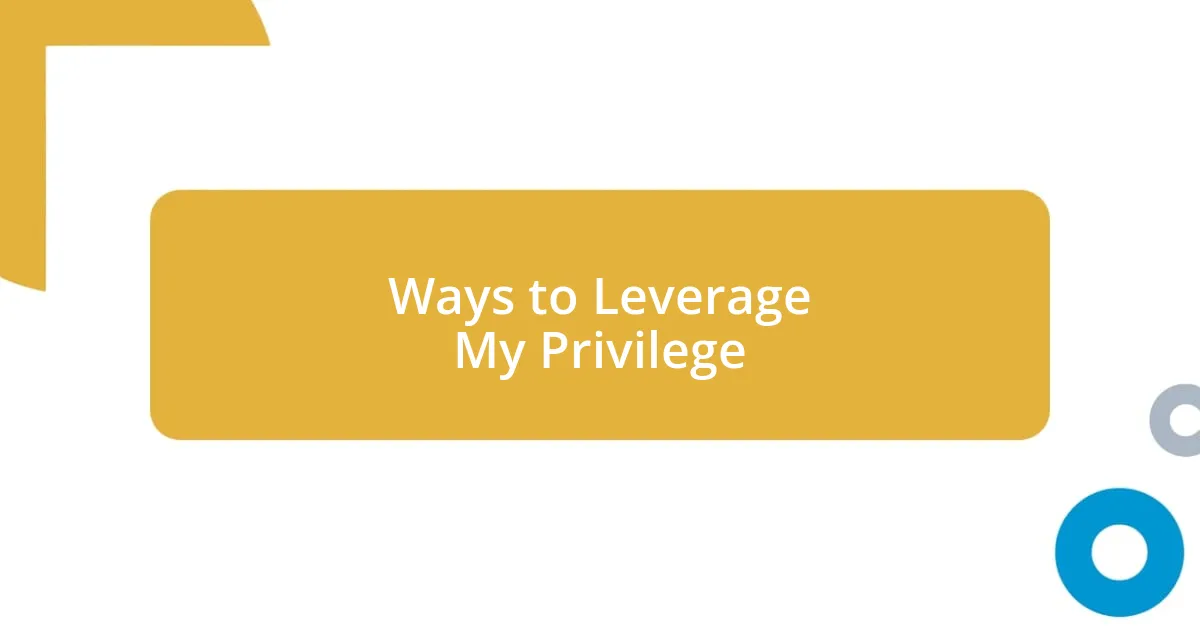
Ways to Leverage My Privilege
Leveraging my privilege is not just a task but a continual commitment to social equity. For instance, I remember volunteering at a local community center where I encountered families striving against daunting odds. Their stories of determination inspired me to utilize my connections and resources to secure internships and mentorship opportunities for the youth there. It was a significant reminder that privilege, when recognized, can be transformed into proactive support for those facing barriers.
To actively leverage my privilege, I focus on various concrete actions:
- Mentorship: I offer guidance to individuals from underrepresented backgrounds, helping them navigate career paths.
- Advocacy: I speak up and share insights at forums and discussions where systemic issues are addressed.
- Inclusive Networks: I make the effort to invite diverse voices into my professional circles, creating spaces for broader representation.
- Resource Sharing: I use my platform to raise awareness and support for organizations that help bridge the opportunity gap.
- Education: I continuously educate myself on the impact of privilege, seeking to understand others’ experiences and challenges.
These actions not only enhance my understanding but contribute to a more inclusive environment for everyone. The connections I build and the resources I share foster a sense of community that can empower others toward success.
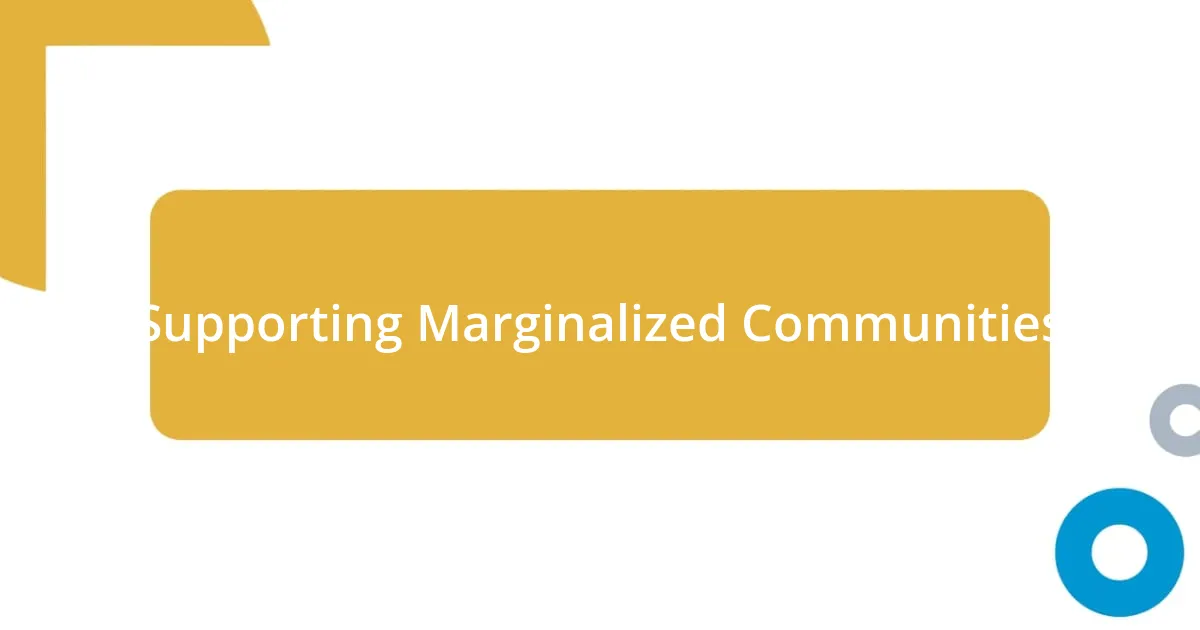
Supporting Marginalized Communities
Supporting marginalized communities has always been a central part of my journey. I recall attending a fundraising event for a youth program serving underprivileged neighborhoods. The energy in the room was palpable, filled with stories of young dreamers eager to make their mark despite the hurdles they faced. Listening to these incredible narratives made me wonder: what if everyone used their privilege to create opportunities for others? I left inspired to take action, realizing that small efforts can lead to significant change.
One time, I volunteered at a local nonprofit that focused on providing resources for single mothers. During my time there, I met a mother who was juggling two part-time jobs and raising her children alone. Her determination struck me deeply. It made me rethink how I could direct my privilege towards advocating for policies that champion women’s rights and support services. I felt a surge of responsibility to amplify her voice, understanding that the more we share these stories, the more we can shift perceptions and drive meaningful support.
When I think about my role in supporting marginalized communities, I see it as a continuous process of learning and action. I make it a goal to educate myself and stay informed about issues affecting those who don’t always have a voice. I’ve found that even just amplifying someone’s message can open doors. So, I ask myself: How can I better use my platform to lift others up? The answer lies in persistent engagement and understanding, opening my world to those that face challenges I may never fully comprehend.
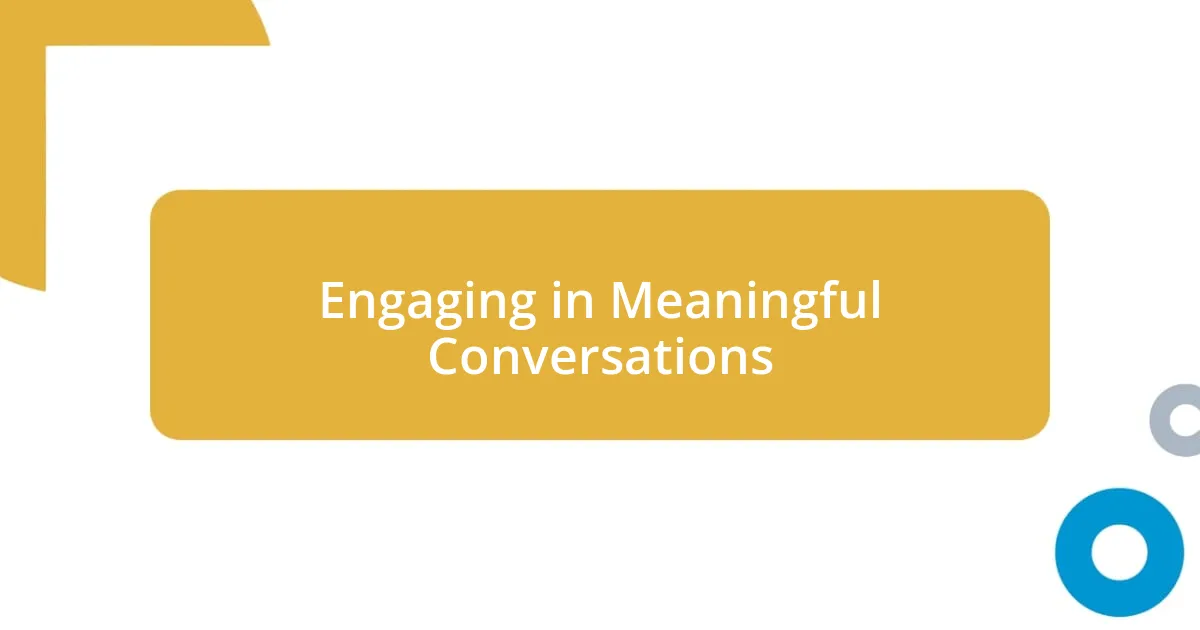
Engaging in Meaningful Conversations
Engaging in meaningful conversations is an essential part of leveraging my privilege. I recall a moment during a community town hall meeting where I initially felt out of place among those sharing their struggles. But as I actively listened, I realized the power of truly hearing someone’s story—not just waiting for my turn to speak. This engagement opened my eyes to the realities faced by others and revealed the importance of creating space for dialogues that matter.
I often lead small group discussions around sensitive topics like race and economic disparity. What I’ve noticed is that vulnerability begets vulnerability. When I share my experiences and acknowledge my privilege, it encourages others to open up about their own journeys. For example, during one of these sessions, a colleague shared her challenges with racial discrimination in the workplace. It reminded me how vital it is to foster an environment where honesty and empathy flow freely, rather than sticking to surface-level conversations.
Creating a dialogue means not only sharing experiences but also asking thoughtful questions. I often ask, “What can we do to uplift each other?” This question ignites discussions that delve deeper into actionable steps that can be taken collectively. I find that these conversations can transform not just individuals but entire communities, lighting the spark needed to inspire change. In engaging with others, I’ve learned that every conversation holds the potential for growth, understanding, and newfound perspectives.
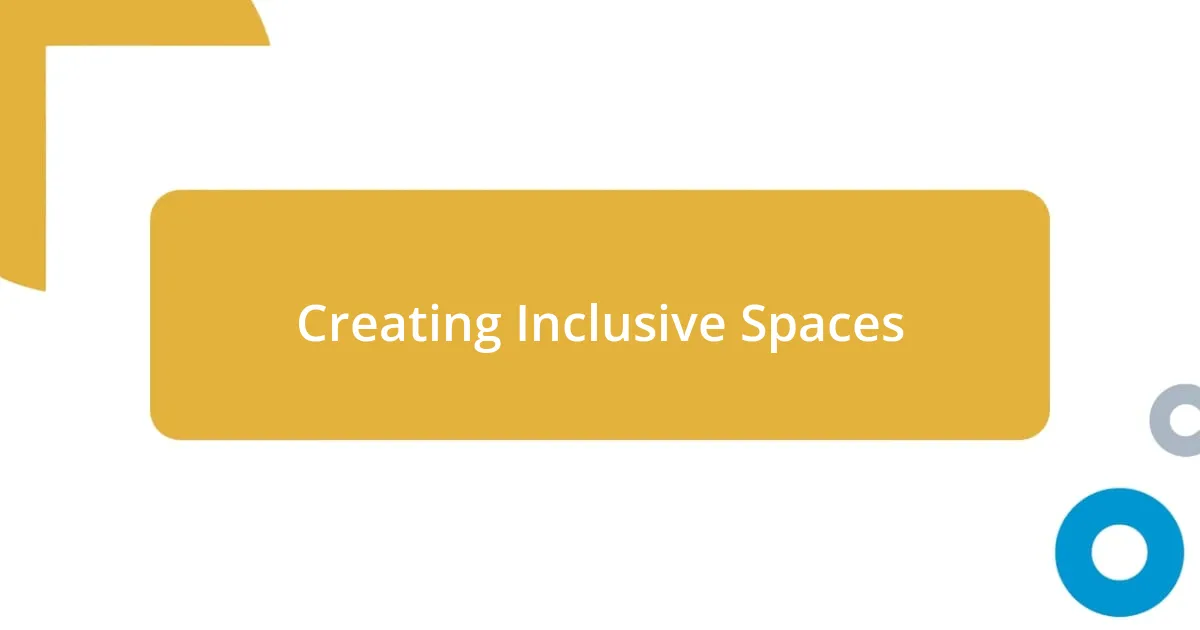
Creating Inclusive Spaces
Creating inclusive spaces starts with a genuine effort to understand and embrace the diverse perspectives around us. I once attended a cultural festival where individuals from various backgrounds shared their traditions through art and stories. It struck me how powerful it was to witness these expressions firsthand. By creating environments where everyone feels seen and celebrated, we not only honor their narratives but also enrich our own understanding of the world. Isn’t it amazing how coming together can foster such connections?
Whenever I host gatherings, I intentionally create a space for everyone to contribute their unique voices. I remember a dinner party where I asked each guest to share a favorite dish that represented their heritage. The table became a vibrant tapestry of flavors and stories, igniting conversations that went beyond our personal experiences. It was a vivid reminder of how inclusivity creates richness; it’s not just about filling seats but about filling hearts with respect and recognition.
I often reflect on how small actions can facilitate broader change. For instance, when organizing team meetings at work, I ensure that every voice is heard, not just the loudest ones. By actively inviting quieter colleagues to share their thoughts, I cultivate a culture of belonging. This practice has made it clear to me that creating inclusive spaces requires ongoing effort and reflection. Why wait for someone else to create the change? Each of us has the power to make a difference, starting with the spaces we inhabit every day.
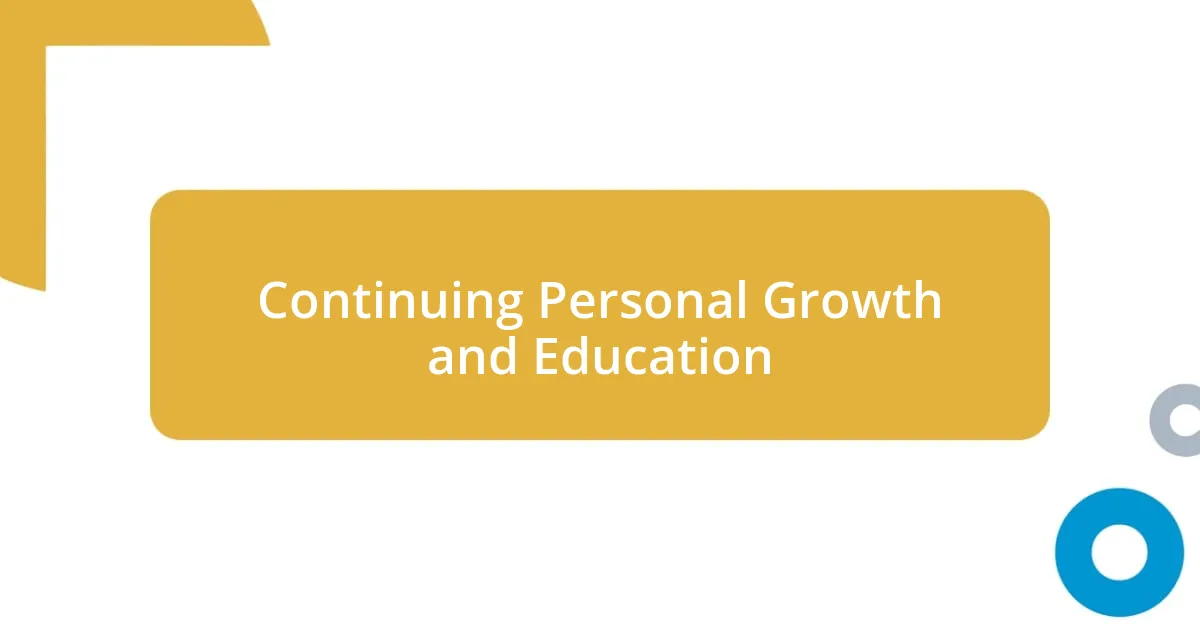
Continuing Personal Growth and Education
Continuing to invest in my personal growth and education fuels my commitment to leveraging my privilege. For instance, I recently enrolled in a course on social justice, which challenged me to confront uncomfortable truths about systemic inequalities. I couldn’t help but feel a blend of discomfort and motivation; the more I learned, the more I realized how essential it is to educate myself continually—not just to enhance my understanding but to better support others.
One evening after class, I connected with a fellow student over coffee, discussing what we had learned. Hearing her experiences as a marginalized voice in academia was eye-opening—it sparked a reflection in me. How often do I stop to consider the perspectives of those who navigate systems very different from my own? That moment reinforced my belief that education isn’t just about absorbing knowledge; it’s about fostering connections that challenge my views and inspire action.
I’ve also found that sharing what I’m learning encourages ongoing growth in others too. When I initiated a book club focused on titles by authors from underrepresented backgrounds, the discussions we had were profound. It became clear to me that each voice added a layer of richness to our conversations, pushing all of us to think deeper. I often wonder—what would happen if everyone committed to continuous learning as a means to uplift those around them? The ripple effect could be significant, transforming not only individual perspectives but entire communities.
